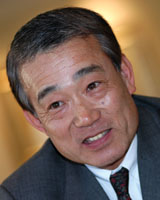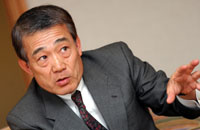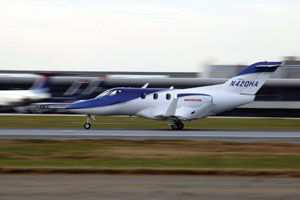Voice: Honda President Takeo Fukui
Back to Contents of Issue: April 2004
|
|
|
|
by Leo Lewis |
|
|
There are various evaluations about how companies are run. Of course it is a great honor, but it is a judgment that refers to past performance, while what really counts is the future. The satisfaction of our customers is everything. They are the true No. 1.
Speaking of customers, just how attractive is the massive Chinese market?
When we talk about China, we do so on the assumption that it is going to grow very quickly. Of all the markets we look at, China is the one that seems most likely to boom.
You have recently moved into building jet engines. What kind of company are you becoming?
We think of ourselves as a personal mobility company. We make jets now, but we also make high-tech mountain bikes. We do motorbikes, outboard motors for boats, airplanes. We are a mobility company, and Asimo, the robot, is another example of this.
In former times, the government was very active in pushing the interests of Japanese companies around the world. Does the old unified "Japan, Inc" mentality still exist?
The jet engine project is a new direction for us, and the Ministry for Economy, Trade and Industry (METI) has been informed about it. They have been encouraging us as we try to break into this new market. I believe that the old Japan, Inc mentality is there -- it just doesn't exist at Honda.
Explain your company's emphasis on fuel cell development and other forms of alternative energy research.
Honda as a business is engaged in automobiles, motorbikes and other equipment that almost all depend on the combustion of fossil fuels. Technology has reduced the hazardous substances emitted from these engines, but the problem of carbon dioxide emissions remains. Based on the research of academic institutions and our own studies, we have realized that there is a risk that the automobile could cease to exist as an entity if we fail to address the greenhouse gas problem. The whole auto industry is endangered.
Some have said that Honda is heavily involved in fuel cells as a means of attracting engineering talent.
No, I don't think that's right. We are researching fuel cells because we think it is necessary to do so. It is our involvement in the Formula 1 races that attracts the engineers. It's the role played by our Formula 1 and motorbike racing divisions. The jet engine development used to have that role, but now that it has also become a business, it clearly justifies itself.
There are two sides to Formula 1. One purpose is to attract talented employees, and to serve as a training ground that allows them to enhance their talents. The other purpose is obviously to win. By winning races, we enhance our corporate brand. The times have changed a lot in Formula 1: There are a number of big automaker players in the race. We are the biggest in the world of motorcycle racing, so we really cannot afford to lose.
Toyota recently became the world's second biggest car maker by volumes sold last year. Can you foresee a time when Honda, Toyota and Nissan might overtake the Detroit big three?
We are not really thinking about getting into the "big three." The numbers that separate us are just too different. Instead, we want to focus ourselves on all our different customer types. We want people who currently own a Honda to buy a Honda again. Of course Japanese and European auto markets are closer in character than Japan and the US. American customers continue to want big vehicles and have different views on the importance of fuel economy. Environmental rules are stricter in the EU and Japan, hence the double popularity of the Fit in both those markets.
The Detroit "big three" offer bigger incentives than the Japanese, so Japanese profitability tends to be higher. What makes a Japanese car company uniquely Japanese?
I doubt Honda is a typical Japanese company. If you were to ask us why we are not offering such big incentives, it is because we are specifically doing everything we can to keep incentives down. At Honda, we do not have a concept of volume supremacy. Our sales and marketing network exceeds our production capacity. At other companies, the production capacity exceeds the marketing. In those cases, they have to offer incentives to keep production going.
Honda has a talent for designing cars that go on to dominate their markets -- like the Accord in the US.
I'm not sure that "talent" is the right word for it. It's more like hard work. It is a capacity for recognizing what is needed, and that is very important. The SED people in Honda US are local staff and part of a team. They work to find a product and they have to try to get it right. They know that the company runs the risk of bankruptcy if they get it wrong -- especially in the US.
Was the arrival of Carlos Ghosn on the Japanese auto scene a good or bad thing?
I'm not sure it was a good thing. The automakers are not in a stronger position than before.
How do you feel about the currency rate issues of the moment?
Sudden changes in currency rates are not desirable. If they just fluctuate in line with the relative strengths and weaknesses of the economies they represent, that is fine. But there is a lot of speculative trading that makes the movements more volatile. It is perfectly appropriate for the Bank of Japan to prevent the yen from becoming too strong.
Last July, Prime Minister Blair came to Japan and met with the top executives of Toyota, Nissan and Honda. I asked Mr. Blair about Britain and the Euro and he said it was only a matter of time before Britain joined. If the UK stays out of Euroland, this would present a challenge. We assumed that the UK would be part of Euroland when we built our plant there. To the British, I say: "Please join quickly!"
How do you exercise central control over the whole Honda empire?
Just because there are lots of independent divisions, there does not need to be a concept of central control. We take pride in devolution, but what unites us is the company philosophy: the three joys of selling Honda, buying Honda and making Honda. We send people out from Japan to blend in and make sure these philosophies remain in place at the divisions around the world.
@ |
|
Note: The function "email this page" is currently not supported for this page.


 The Nikkei has just named you the No. 1 company in Japan for corporate excellence. How do you feel?
The Nikkei has just named you the No. 1 company in Japan for corporate excellence. How do you feel?
 So is the Formula 1 investment worth the money?
So is the Formula 1 investment worth the money?
 How about the Euro? Britain has not yet joined the rest of the EU in adopting a single currency.
How about the Euro? Britain has not yet joined the rest of the EU in adopting a single currency.




